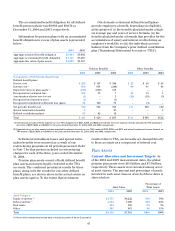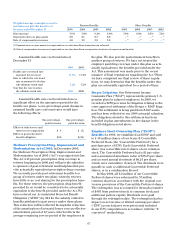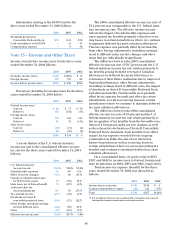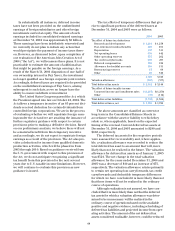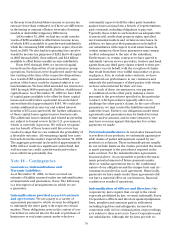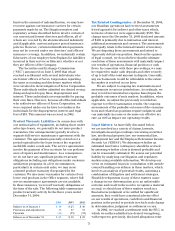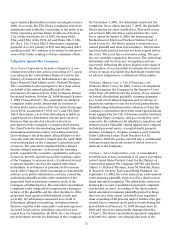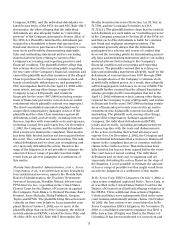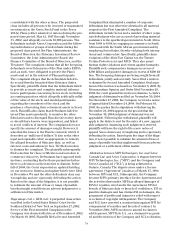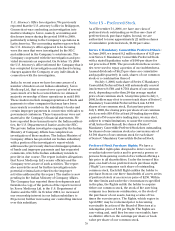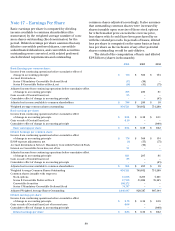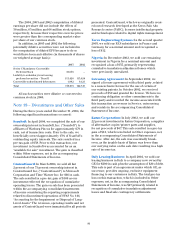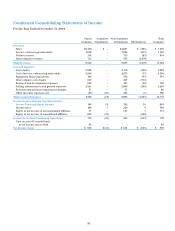Xerox 2004 Annual Report Download - page 77
Download and view the complete annual report
Please find page 77 of the 2004 Xerox annual report below. You can navigate through the pages in the report by either clicking on the pages listed below, or by using the keyword search tool below to find specific information within the annual report.
75
MPI’s copyright claim was denied. The hearing of the
arbitration commenced on January 18, 2005 and is
expected to last approximately three months. The
Company and XCL deny any wrongdoing, deny that
any damages are owed and are vigorously defending
the action. It is not possible at this stage of the arbitra-
tion to estimate the amount of loss or the range of pos-
sible loss that might result from an adverse ruling or a
settlement of this matter.
Accuscan, Inc. v. Xerox Corporation: On April 11,
1996, an action was commenced by Accuscan, Inc.
(“Accuscan”), in the United States District Court for the
Southern District of New York, against the Company
seeking unspecified damages for infringement of a
patent of Accuscan which expired in 1993. The suit, as
amended, was directed to facsimile and certain other
products containing scanning functions and sought
damages for sales between 1990 and 1993. On April 1,
1998, a verdict was entered in favor of Accuscan for
$40. However, on September 14, 1998, the court grant-
ed our motion for a newtrial on damages. The trial
ended on October 25, 1999 with a verdict of $10. We
appealed to the Court of Appeals for the Federal Circuit
(“CAFC”) which found the patent was not infringed,
therebyterminating the lawsuit subject to an appeal
which was filed by Accuscan to the U.S. Supreme
Court. The decision of the U.S.Supreme Court was to
remand the case back to the CAFCto consider its
previous decision based on the U.S. Supreme Court’s
May 28, 2002ruling in the Festo case. OnSeptember
17, 2003, the CAFCreconsidered the case and again
held that the patent was not infringed. On December
15, 2003, Accuscan filed a petition to the U.S. Supreme
Court to appeal the CAFC’s September 17, 2003 deci-
sion. This petition was denied on February 23, 2004.
The period during which Accuscan could obtain
reconsideration of the Supreme Court’s denial of the
petition for writ of certiorari has expired. Xerox and
Accuscan have filed a joint motion with the District
Court to have a judgment (consistent with the mandate
issued by the CAFC) entered for Xerox. The parties are
awaiting action on the motion by the District Court.
National Union Fire Insurance Company v. Xerox
Corporation, et al.: On October 24, 2003, a declaratory
judgment action was filed in the Supreme Court of the
State of New York, County of New York against the
Company and several current and former officers
and/or members of the Board of Directors. Plaintiff
claims that it issued an Excess Directors & Officers
Liability and Corporate Reimbursement Policy to the
Company in reliance on information from the
Company that allegedly misrepresented the Company’s
financial condition and outlook. The policy at issue
provides for $25 of coverage as a component of the
company reimbursement portion of an insurance
program that provides for up to $135 coverage (after
deductibles and coinsurance and subject to other
policy limitations and requirements) over a three-year
period. However, $10 of the entire amount may be
unavailable due to the liquidation of one of the other
insurers. Plaintiff seeks judgment (i) that it is entitled
to rescind the policy as void from the outset; (ii) in the
alternative, limiting coverage under the policy and
awarding plaintiff damages in an unspecified amount
representing that portion of any required payment
under the policy that is attributable to the Company’s
and the individual defendants’ own misconduct; and
(iii) for the costs and disbursement of the action and
such other relief as the court deems just and proper.
On December 19, 2003, the Company and individual
defendants moved to dismiss the complaint. On
November 10, 2004, the Court issued an opinion
partially granting and partially denying the motions.
Among other things, the Court granted the motions to
dismiss all of the claims for rescission and denied
plaintiff’srequest to replead. The Court denied the
Company’s and some of the individual defendants’
motions to dismiss certain claims seeking to limit
coverage based on particular provisions in the policy.
Plaintiff filed notices of appeal on January 10, 2005
and February 11, 2005. The Company and the
individual defendants intend to seek dismissal of the
remaining claims. The Companyand the individual
defendants deny any wrongdoing and are vigorously
defending the action.
Warren, et al. v. Xerox Corporation: On March 11,
2004, the United States District Court for the Eastern
District of New York entered an order certifying a
nationwide class of all black salespersons employed
by Xerox from February 1, 1997 to the present under
Title VII of the Civil Rights Act of 1964, as amended,
and the Civil Rights Act of 1871. The suit was
commenced on May 9, 2001 by six black sales repre-
sentatives. The plaintiffs allege that Xerox has engaged
in a pattern or practice of race discrimination against
them and other black sales representatives by assign-
ing them to less desirable sales territories, denying
them promotional opportunities, and paying them
less than their white counterparts. Although the com-
plaint does not specify the amount of damages sought,
plaintiffs do seek, on behalf of themselves and the
classes they seek to represent, front and back pay,
compensatory and punitive damages, and attorneys’
fees. We deny any wrongdoing and are vigorously
defending the action. Based on the stage of the litiga-
tion, it is not possible to estimate the amount of loss
or range of possible loss that might result from an
adverse judgment or a settlement of this matter.


